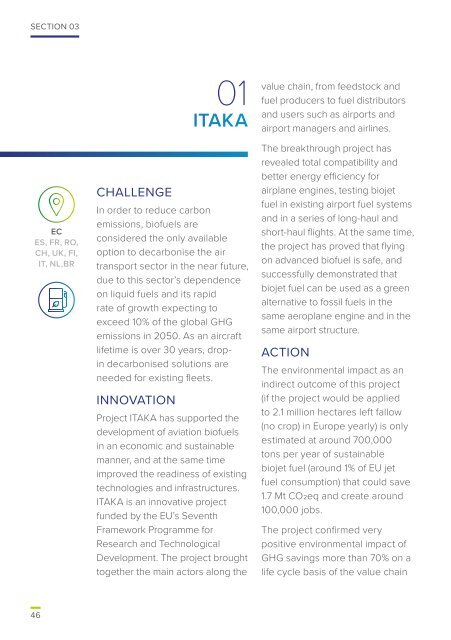MI 2020 Solutions FINAL
Create successful ePaper yourself
Turn your PDF publications into a flip-book with our unique Google optimized e-Paper software.
SECTION 03<br />
FUELS<br />
01<br />
ITAKA<br />
value chain, from feedstock and<br />
fuel producers to fuel distributors<br />
and users such as airports and<br />
airport managers and airlines.<br />
© Maksym Yemelyanov - fotolia.com<br />
EC<br />
ES, FR, RO,<br />
CH, UK, FI,<br />
IT, NL,BR<br />
CHALLENGE<br />
In order to reduce carbon<br />
emissions, biofuels are<br />
considered the only available<br />
option to decarbonise the air<br />
transport sector in the near future,<br />
due to this sector’s dependence<br />
on liquid fuels and its rapid<br />
rate of growth expecting to<br />
exceed 10% of the global GHG<br />
emissions in 2050. As an aircraft<br />
lifetime is over 30 years, dropin<br />
decarbonised solutions are<br />
needed for existing fleets.<br />
INNOVATION<br />
Project ITAKA has supported the<br />
development of aviation biofuels<br />
in an economic and sustainable<br />
manner, and at the same time<br />
improved the readiness of existing<br />
technologies and infrastructures.<br />
ITAKA is an innovative project<br />
funded by the EU’s Seventh<br />
Framework Programme for<br />
Research and Technological<br />
Development. The project brought<br />
together the main actors along the<br />
The breakthrough project has<br />
revealed total compatibility and<br />
better energy efficiency for<br />
airplane engines, testing biojet<br />
fuel in existing airport fuel systems<br />
and in a series of long-haul and<br />
short-haul flights. At the same time,<br />
the project has proved that flying<br />
on advanced biofuel is safe, and<br />
successfully demonstrated that<br />
biojet fuel can be used as a green<br />
alternative to fossil fuels in the<br />
same aeroplane engine and in the<br />
same airport structure.<br />
ACTION<br />
The environmental impact as an<br />
indirect outcome of this project<br />
(if the project would be applied<br />
to 2.1 million hectares left fallow<br />
(no crop) in Europe yearly) is only<br />
estimated at around 700,000<br />
tons per year of sustainable<br />
biojet fuel (around 1% of EU jet<br />
fuel consumption) that could save<br />
1.7 Mt CO2eq and create around<br />
100,000 jobs.<br />
The project confirmed very<br />
positive environmental impact of<br />
GHG savings more than 70% on a<br />
life cycle basis of the value chain<br />
and negligible particle shoot emissions<br />
due to the fuel source and handling while<br />
engine tests proved more than 30%<br />
improvement for the local air quality at<br />
airports.<br />
For the market out-reach, the project<br />
established supply of biojet fuel through<br />
conventional logistics channels and<br />
illustrated that the declaration of its use<br />
is possible under the Emissions Trading<br />
Scheme and the Renewable Energy<br />
Directive policies.<br />
POTENTIAL<br />
Since January 2017, biojet fuel produced<br />
in the EU was used for the first time<br />
worldwide by more than 6 million<br />
passengers in around 60,000 flights.<br />
Recognising that scaling up is critical<br />
for bringing innovation to the market,<br />
a new project (BIO4A) is supported<br />
under Horizon <strong>2020</strong> ensuring industry<br />
commitment as part of retrofitting Total’s<br />
refinery in La Méde France which has<br />
renewable fuel capacity of several<br />
hundred thousand tonnes per year.<br />
The production of 5,000- 10,000<br />
thousand tonnes of biojet fuel within<br />
the project is supported also through<br />
take off agreements for its purchase<br />
by KLM and Air France.<br />
USEFUL LINKS:<br />
ec.europa.eu/research/infocentre/<br />
article_en.cfm?artid=44616<br />
46 47


